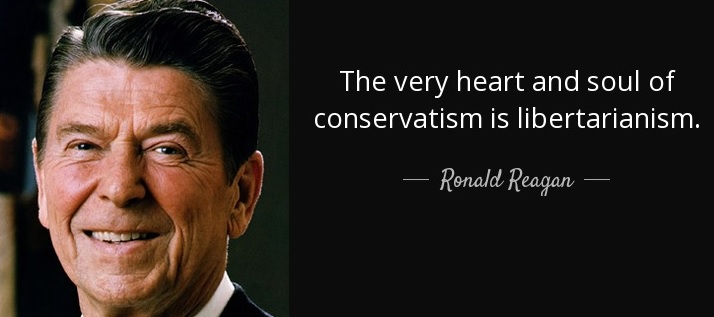Based on a study I authored for the Club for Growth Foundation, I’ve dedicated this week to a series about Reaganomics.
- Part I was about Reagan’s track record on spending and lessons for today.
- Part II was about Reagan’s track record on taxes and lessons for today.
- Part III was about Reagan’s track record on red tape and lessons for today.
- Part IV was about Reagan’s track record on inflation and lessons for today.
The main takeaway from those columns is that Reagan’s policies were very successful.
Which probably helps to explain why polling data shows that Reagan is still very popular with voters
(you can see my favorite poll result here).
In a bizarre twist, however, there are some Republicans who think Reagan’s free-market principles are outdated.
These people call themselves national conservatives, though I think of them as reincarnated Rockefeller Republicans (what else would you call people who favor awful policies such as industrial policy and tax increases?).
Today’s column explains why they are wrong.
…many of Reagan’s reforms have been eroded over the past 30-plus years, and the United States is once again facing major economic challenges. Is it time for Reaganomics 2.0? Some argue that America faces different problems that require different solutions. They assert that pushing for the same policies is “Zombie Reaganism.” Many of those critics are avowed leftists, so their antipathy is not surprising. But there are also some self-described conservatives who use the same term to express hostility. …To assess the merits of modern-day small-government conservatism, this paper will briefly explain the problems Reagan faced and the solutions he pursued, followed by an examination of today’s problems and the degree to which similar policies could and should apply. In short, America faces remarkably similar challenges to those that confronted President Reagan. …Policymakers who wish to boost middle-class incomes would be wise to emulate President Reagan.
For what it’s worth, I think some of the national conservatives are not statists. Instead, they merely think they should reject Reaganism for non-economic reasons.
So I included a section about being in favor of limited government regardless of views on other topics.
They assume support for Reagan-style small government conservatism:
- implies support for other policies adopted during the Reagan years, such as immigration amnesty.
- comes at the expense of conservative social policy.
- means no concern for the value of a defense industrial base.
- means being in favor of a “neoconservative” nation-building agenda.
- is somehow inconsistent with communitarian values.
This paper does not address those issues, other than to state that the desirability of Reagan’s four-pillar agenda does not depend on those other topics.
The bottom line is that everyone should be united by a desire for greater prosperity. And that explicitly implies being in favor of free markets and limited government.
P.S. The only hyphenated conservatism I like is small-government conservatism. In previous columns, I’ve pointed out the shortcomings of compassionate conservatism, kinder-and-gentler conservatism, common-good capitalism, and reform conservatism.
P.P.S. At the risk of understatement, Reagan was a not a small-government conservative in his younger days. Like a fine wine, however, he improved with age, migrating to the top-right of my Venn diagram.

No comments:
Post a Comment